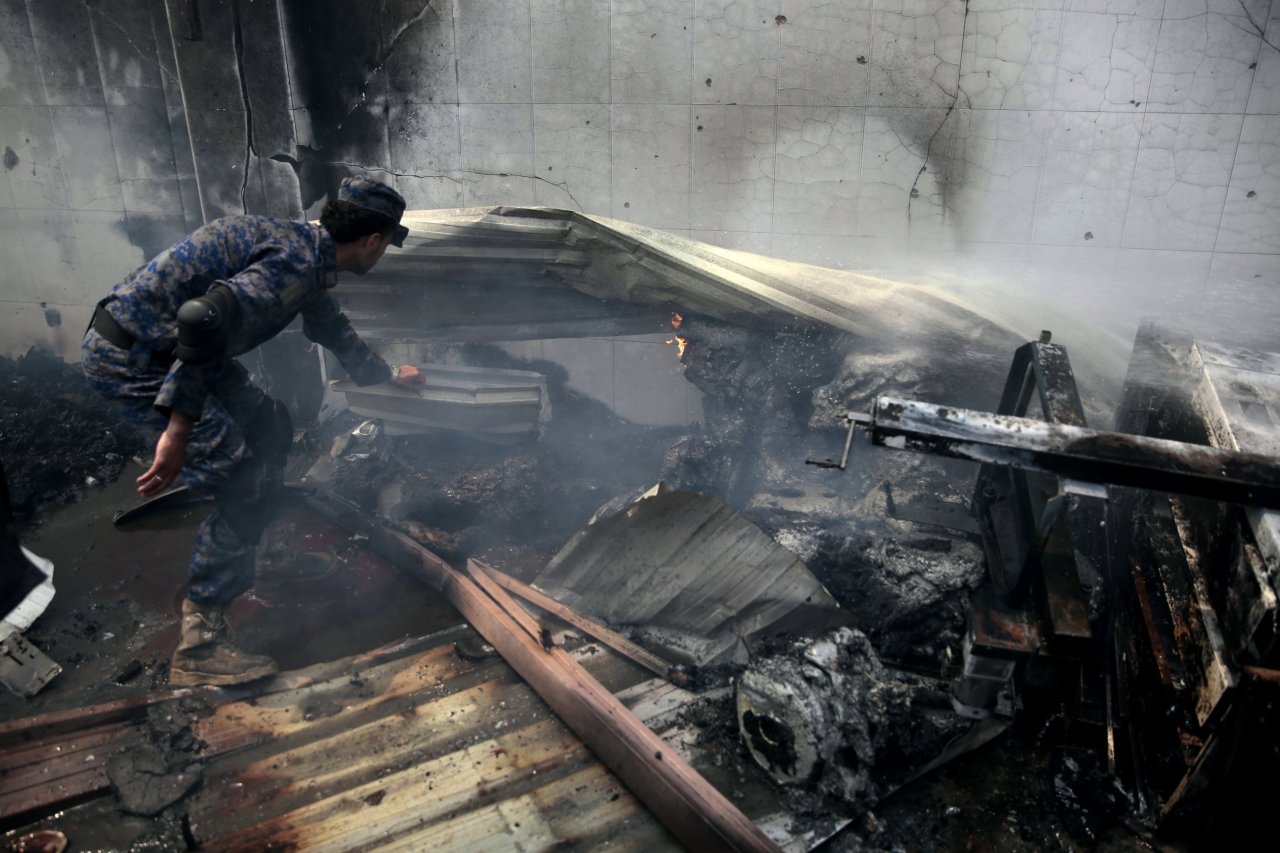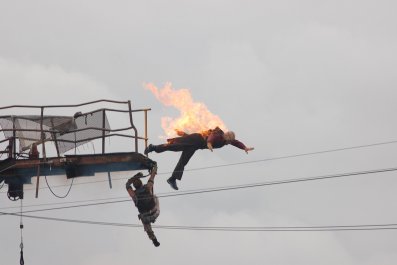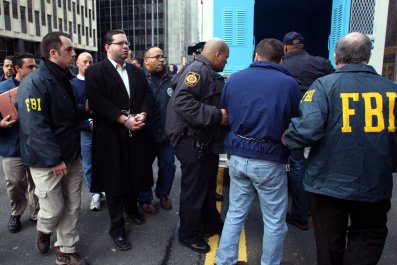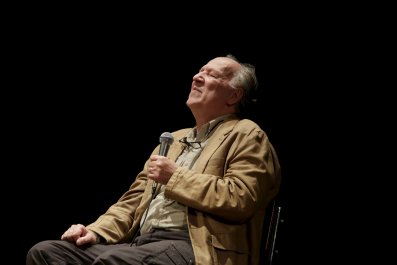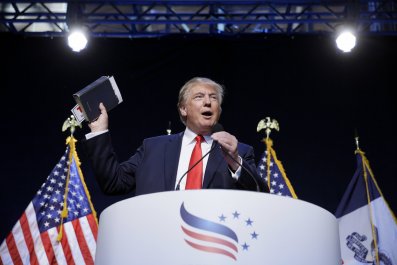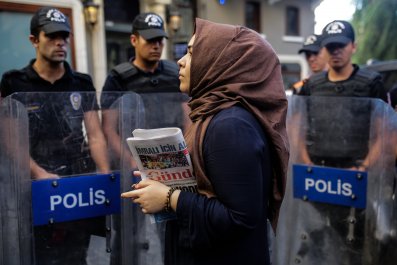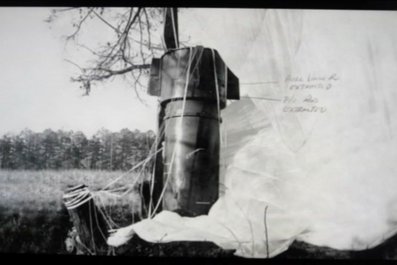One year ago, Ahmed Ibrahim al-Mughassil prepared to board a flight from Beirut to Tehran, Iran's capital. Before he could, foreign intelligence agents who had slipped into the country weeks earlier snatched him and whisked him back to their capital, where to this day he sits in detention.
The men who carried out the arrest were from Al-Mukhabarat al-A'amah—the foreign intelligence service of the House of Saud, the Kingdom of Saudi Arabia. Al-Mughassil is a Saudi Shiite and a member of the military arm of the Iran-funded extremist group Saudi Hezbollah, which seeks the downfall of the royal family in Riyadh. And his arrest had been a long time coming—nearly 20 years, in fact. Al-Mughassil is accused of being the ringleader of the 1996 bombing of the Khobar Towers in Saudi Arabia, in which 19 U.S. servicemen were killed. Al-Mughassil immediately fled to Tehran after that blast, and, according to regional intelligence sources, has remained under Iranian and Hezbollah protection ever since, mainly in Beirut.
His arrest last year was another front in a deepening cold war between Saudi Arabia and Iran that is coming to define the Middle East in the 21st century. Their intensifying rivalry exemplifies the bitter schism within Islam itself: Riyadh sees itself as the standard bearer of Sunni Muslims in the region and views the Shiite theocracy in Iran—now becoming more powerful than ever, thanks to a nuclear deal that has reduced international sanctions on Tehran—as its mortal enemy. Under the leadership of King Salman bin Abdulaziz al-Saud, who ascended to the throne last year, the Saudis are challenging Iran on multiple fronts.
Those include two proxy wars. One is in Yemen, which borders Saudi Arabia. The Saudis intervened there last year to prevent Iranian-backed Houthi rebels from taking control of the country. The war has dragged on ever since, with the Houthis still entrenched in the capital, Sanaa, as well as in their stronghold in the northern part of the country. As John Hannah, a regional analyst at the Foundation for the Defense of Democracies (FDD), says, the standoff has resulted in a failed state, one that is home to one of Al-Qaeda's most lethal affiliates, known as Al-Qaeda in the Arabian Peninsula, and now "appears destined to be a fertile breeding ground for jihadism, sectarian conflict and regional instability for years to come." Thousands of civilians have been killed in airstrikes by the Saudi-led coalition, which relies on U.S. support.
The other proxy war is the conflict in Syria, which has claimed nearly 500,000 lives and shows no sign of abating. Tehran is dictator Bashar Al-Assad's patron—supplying the embattled regime with arms and fighters, both from Iran and from the Tehran-backed Hezbollah group in Lebanon. Tehran also now flaunts a de facto alliance with Vladimir Putin and Russia, which on August 16 began using an air base in Iran to launch strikes against anti-Assad rebels in Syria.
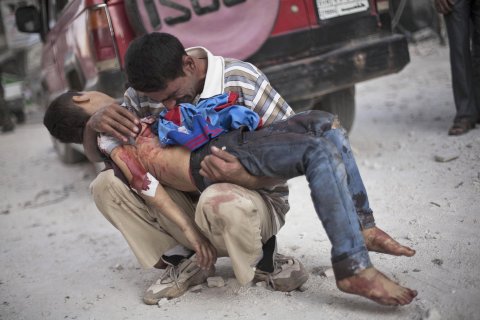
Over the past year, the intervention of Tehran and Moscow has turned that fight in Assad's favor. But the Saudis continue to pour in weapons to Sunni fighters in Syria and have even said they would supply ground troops if the U.S. would back a more aggressive strategy to remove Assad. A regional intelligence source says an influx of Saudi-supplied weapons has held back government efforts to retake the key city of Aleppo.
The carnage in Syria comes as Riyadh's relationship with Washington grows increasingly tense. The Saudis believe President Barack Obama, in pursuing the nuclear deal with Iran, has completely upended the security status quo in the Gulf and throughout the region. The Saudis were eager for Obama to follow through on his vow to act if what he called a "red line" was crossed in Syria—when he said Assad would have to go if he were to use chemical weapons. The president failed to do that, has resisted calls within his administration to more aggressively arm and train anti-government rebel groups in Syria, and has talked openly about having to be mindful of Iranian "equities" in Syria—all of which has infuriated Riyadh. Salman is said to believe it is because Obama did not want to antagonize Tehran before the nuclear deal was signed, and still doesn't for fear that Iran will walk away from it. (This is a widely held belief throughout the Sunni Arab world.) "Salman," says the regional intelligence officer, "has no use for Obama. He can't wait until he's gone."
Obama has said he hopes that the Saudis and Iranians can reach an "equilibrium" in the Gulf, and that Riyadh must be content with "sharing'' power with its archrival. In the Saudi view, the U.S. retreat in the region has not resulted in "equilibrium" but instead has created a vacuum Tehran seeks to fill. Salman, says the regional intelligence source, "is very determined to make sure that doesn't happen," which is why he's confronting Tehran on so many fronts.
As the FDD's Hannah notes, the Saudis have also used their chief economic weapon—oil—to deprive Iran of as much money as they can, now that Tehran can sell crude globally, free of sanctions. Despite a glut of oil and a prolonged period of weak prices, the Saudis have resisted calls to cut their production to boost prices. In September, the OPEC nations and Russia are set to meet in Algiers, Algeria, to discuss production freezes. But with Moscow, the third largest oil producer in the world, working with Tehran, the Saudis are unlikely to play along.
"We see nothing to indicate that they want anything other than lower prices longer in order to deprive Russia and Iran of revenue," says a diplomat in a neighboring Gulf country. "They've been using this weapon for two years now, and they're likely to continue using it."
Riyadh has also been active diplomatically in order to punish Tehran. When the Saudis executed a prominent Shiite cleric in January—after Iran had warned them not to—mobs attacked and burned down Saudi diplomatic facilities in Iran. The Saudis quickly severed diplomatic relations with Iran and pressured fellow Arab League nations to downgrade relations as well. As Hannah notes, the only one that didn't—Lebanon—"quickly felt the Saudis' wrath." Riyadh cut off $4 billion in aid to Beirut's military and warned Saudi citizens to stop going to Lebanon as tourists or for business.
Hannah and other regional analysts believe the House of Saud might be behind recent unrest among Iranian minority groups. Kurdish forces have clashed with Iran's Islamic Revolutionary Guard Corps troops, and ethnic Arabs have claimed credit for attacks this summer against Iranian oil pipelines. Hannah notes that Turki al-Faisal, a member of the royal family and formerly head of Saudi intelligence, as well as an ambassador to London and Washington, gave a high-profile speech in July before Mujahedeen-e-Khalq, an Iranian exile group that Tehran considers a terrorist organization. Among other things, Turki said, "I too want the downfall of the regime."
This is dangerous stuff. Tehran could try to destabilize the regime in Riyadh. And while no one yet believes the two countries will clash directly, there is growing regional restiveness about the proxy wars continuing without end and even intensifying. The Jordanians in particular would like to see a ratcheting down of tensions between Riyadh and Tehran, given their proximity to the Syrian conflict and the burden of having to take in more than 1.2 million refugees (so far). "But what they would like to see," says a Western intelligence source working in the region, "is very different from what they're likely to get." The Middle East's Cold War, the source predicts, "is likely to intensify before it abates."



